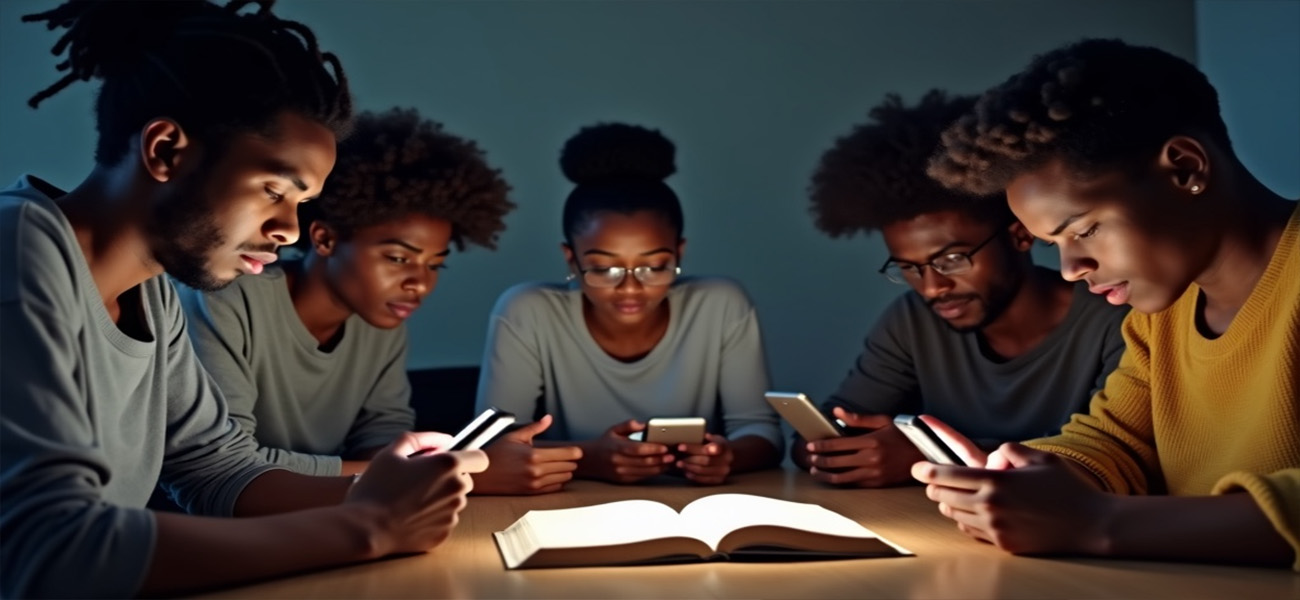Social media is a unique blend of open conversations and hidden identities. While some users proudly display their names and photos, others prefer to remain anonymous or create fake profiles. This anonymity often intrigues me — why do people feel the need to hide behind a mask in a space that celebrates connection?
As someone dedicated to promoting truth and combating misinformation through the FactCheck Initiative, I’ve encountered numerous instances of online anonymity. Navigating this digital landscape has revealed that the reasons for anonymity range from protective instincts to deliberate manipulation. In response to these challenges, we’re developing a feature in the Kaci Help app called “Beep,” where users can share posts either openly or anonymously.
In this article, I’ll examine 10 aspects of online anonymity, sharing real-life examples and personal insights to uncover this intriguing phenomenon.
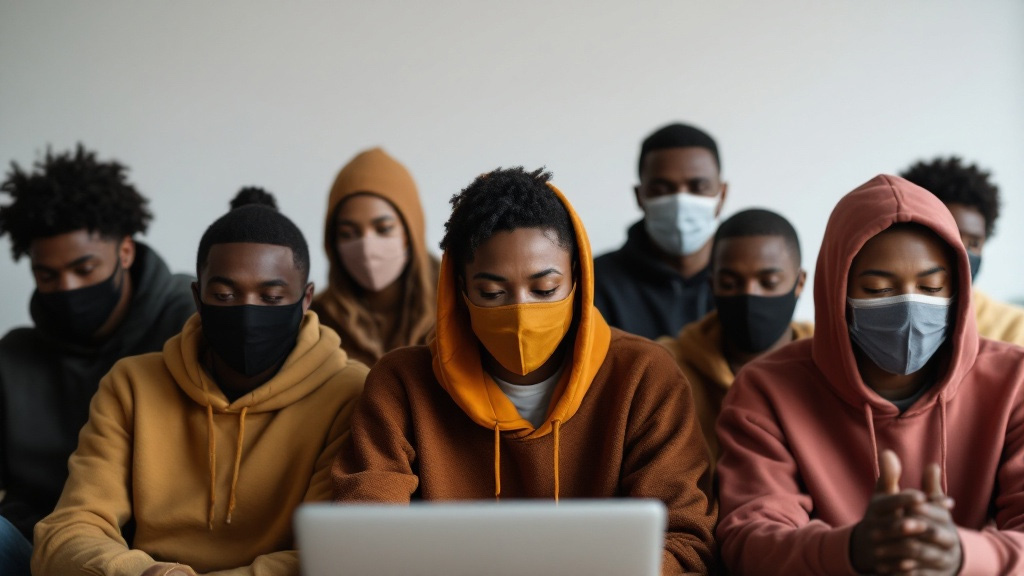
1. “I Don’t Want Anybody Tracing Me” — Protecting Safety and Career

In today’s world, being outspoken can come with risks. Many people choose anonymity because they fear being traced to their comments or posts.
I remember a journalist who anonymously joined a Twitter Space to discuss corruption within a major government agency. Though they had firsthand knowledge of the misconduct, revealing their identity could have jeopardized their career and personal safety. Using a pseudonym allowed them to share critical information and spark a broader conversation without fear of retaliation.
This isn’t just limited to Nigeria. Globally, people who challenge societal norms or fight for change often rely on anonymous accounts for protection. In these cases, anonymity isn’t a mask — it’s armor.
2. “Please, Hide My Identity!” — Anonymous Advice Seekers

One of the most heartwarming and relatable reasons for going anonymous is when people share personal stories seeking advice. Singles and couples often send their experiences to blogs I follow, asking them to post anonymously so they can receive feedback without judgment.
A woman once sent a story about her struggling marriage to a popular relationship blog, pleading for anonymity. She wanted to hear what others thought about her situation but didn’t want her husband or in-laws to recognize her. The blog posted her story without revealing her identity, and she silently read through the comments, gaining fresh perspectives from strangers.
This shows that anonymity isn’t always about hiding — it’s about creating a safe space to learn, grow, and understand. Sometimes, people just want honest advice without the fear of being exposed.
3. “It’s Just Politics” — Creating Fake Accounts for Propaganda
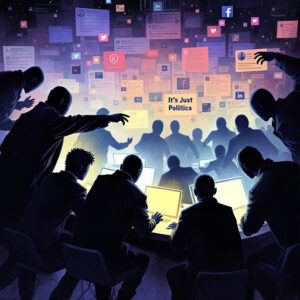
Politics has always been a game of strategy, and in the digital age, anonymity has become one of its most powerful tools. Politicians and their aides often create fake accounts to manipulate public opinion, spread propaganda, or discredit opponents.
During Nigeria’s last election season, I noticed a strange pattern on Twitter. A particular candidate’s post was flooded with negative comments, accusing them of corruption and incompetence. Upon closer inspection, it turned out that many of the accounts were fake — created by the opposing camp to stir distrust among the candidate’s supporters.
It doesn’t stop there. Politicians sometimes use these fake accounts to comment positively on their own posts, pretending to be ordinary citizens endorsing their views. This tactic creates an illusion of widespread support and can sway public perception.
One chilling example involved an anonymous account spreading false allegations about an opponent, claiming they were involved in criminal activities. The goal was clear: plant seeds of doubt and distract voters from the real issues.
Through FactCheck Initiative, I’ve seen firsthand how these tactics can polarize communities and amplify misinformation. Anonymity in politics isn’t just about protection — it’s often a weapon used to manipulate, deceive, and control narratives.
This highlights the darker side of online anonymity, where it becomes a tool not for safety or exploration but for exploitation. It’s a reminder that in the digital age, not everything we see or read can be trusted.
4. “Boosting My Business” — Fake Accounts for Engagement

In the competitive world of social media marketing, engagement is king. For some business owners, the pressure to appear successful and active online leads them to create fake accounts to follow their pages and leave comments on their posts.
I once stumbled upon a small business page that seemed too good to be true. Every post had glowing comments like “Wow, amazing quality!” or “Highly recommended!” Yet, after a quick check, many of these accounts had no profile pictures or real activity. It turned out the business owner had created multiple fake profiles to make the page look more popular than it actually was.
This tactic isn’t unique to one business. A friend running a boutique admitted to doing the same. “When people see others engaging with your brand, they’re more likely to trust and buy from you,” she said. She’d created a few accounts just to like her posts, leave positive reviews, and reply to inquiries to simulate a bustling online store.
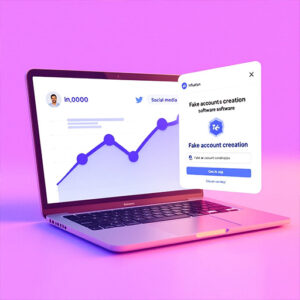
While this approach might give the illusion of success, it raises ethical questions. Fake engagement may attract genuine customers initially, but if the product or service doesn’t match the hype, the truth will eventually come out.
As someone who creates content for brands, I understand the importance of real engagement. Authenticity always wins in the long run. Business owners who rely on fake accounts risk damaging their credibility and losing the trust of their audience. Social media success should be built on genuine relationships, not fabricated interactions.
5. “I’m Here for the Drama” — The Trolls and Scammers

On the flip side, some people hide their identities for all the wrong reasons. Scammers, trolls, and troublemakers thrive in anonymity.
A close friend, Blessing, once told me about how she was almost scammed by someone claiming to be a foreign investor. They had a profile full of luxury, charm, and too-good-to-be-true offers. Thanks to some quick fact-checking, she dodged the trap.
Then there are the trolls — those faceless accounts that love to stir trouble. Hidden behind their fake profiles, they spread hate and misinformation without fear of consequences. Through FactCheck Initiative, I’ve dealt with several cases of these anonymous accounts spreading fake news, especially during elections.
6. “It’s for Personal Privacy” — Securing Digital Footprint
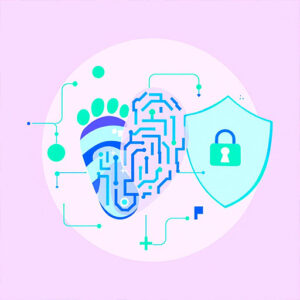
In an era where personal data is constantly at risk, anonymity can be a form of protection. From cyberstalkers to hackers, privacy concerns are growing, and many people choose to shield their identities to protect their safety.
I spoke with a cybersecurity expert who explained how easily personal information can be exploited. From location tracking to identity theft, the risks are very real. For some, anonymity isn’t just a choice — it’s a necessity.
Consider the case of whistleblowers who expose corruption or corporate misconduct. Without anonymity, their safety and credibility could be compromised. Their contributions, however, have been instrumental in fostering accountability and driving change.
7. “It’s Just a Game” — Avoiding Accountability

Not all uses of anonymity are benign. Some people use it as a tool to avoid responsibility for their actions, from spreading hateful rhetoric to cyberbullying.
A notable example is the infamous “Twitter trolls” who target public figures with harassment campaigns. Hidden behind fake profiles, they unleash vitriol without consequence.
Through FactCheck Initiative, I’ve worked to expose such accounts and advocate for stronger measures to hold them accountable. While anonymity is a right, it should not be weaponized to harm others.
8. “I’m Just Bored” — Exploring Different Personas

For some, creating an anonymous account is simply about having fun. People may not be looking to manipulate or hide something; they’re just playing with different personas or exploring new aspects of their personality.
I once came across a friend who created a fake TikTok account to try out comedic skits and impressions without worrying about being judged. Over time, the account gained a small following, and he discovered a passion for comedy that he hadn’t realized before.
Sometimes, anonymity is just about trying new things and exploring different aspects of yourself that might not fit into your regular, everyday life.
9. “I’m Just Exploring Myself” — Self-Discovery Through Anonymity
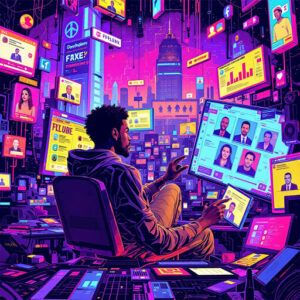
Sometimes, anonymity is about self-discovery. People use fake accounts to explore parts of themselves they’re too shy or scared to reveal.
A guy I met during a media literacy training shared his story about starting an anonymous Instagram account to post his art. He feared his peers would judge him for not pursuing a “serious” career, so he created a safe space for himself. To his surprise, the account gained traction, and the positive feedback gave him the confidence to post under his real identity.
For many, anonymity is a stepping stone — a way to test the waters before diving in fully.
10. “I’m Reinventing Myself” — Fostering Personal Growth

For some individuals, anonymity offers the unique opportunity to reinvent themselves or create an entirely new persona that aligns with their aspirations. It provides a space to experiment with different identities without the constraints of real-life expectations or judgments.
I recall meeting a woman at a workshop who shared her experience of creating a fake Twitter account where she portrayed herself as a tech entrepreneur. This anonymous account allowed her to step into a world of opportunity she hadn’t yet been able to access in her real life. By connecting with influential industry leaders and gathering crucial business insights, she gained the confidence and knowledge to eventually launch her own successful startup.
This kind of anonymity isn’t about trickery or false representation. Instead, it’s about envisioning a future version of oneself, testing the waters, and gathering the necessary tools and connections to make that vision a reality. It’s a reminder that sometimes the digital world can serve as a stepping stone to real-world success.
Balancing Anonymity and Accountability
Anonymity is a double-edged sword. It can empower and protect, but it can also harm and deceive. The challenge is finding a balance. Through FactCheck Initiative and tools like Kaci Help, I’m committed to promoting responsible online behavior while respecting people’s right to anonymity.
Very soon, we will release a new feature in the Kaci Help app called “Beep,” where users can share posts both openly and anonymously. This feature will allow users to see, comment on, and like posts while maintaining their privacy. We will be testing the anonymous options to ensure a safe and balanced environment within the app.
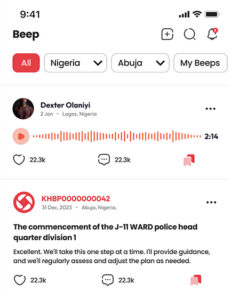
Screenshot of the Kaci Help App in development, showing the Anonymous Beep (Post).
Conclusion: The Mask We Wear
The reasons people hide their identities online are as diverse as the digital world itself. Whether it’s for safety, exploration, or deception, anonymity reflects the complexity of human nature.
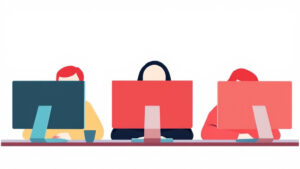
For me, Temitope Adeoye, this journey of unmasking anonymity is both professional and personal. By understanding why people choose to hide, we can create a digital space that values both freedom and responsibility.
What’s your take on online anonymity? Share your thoughts — I’d love to hear them!



